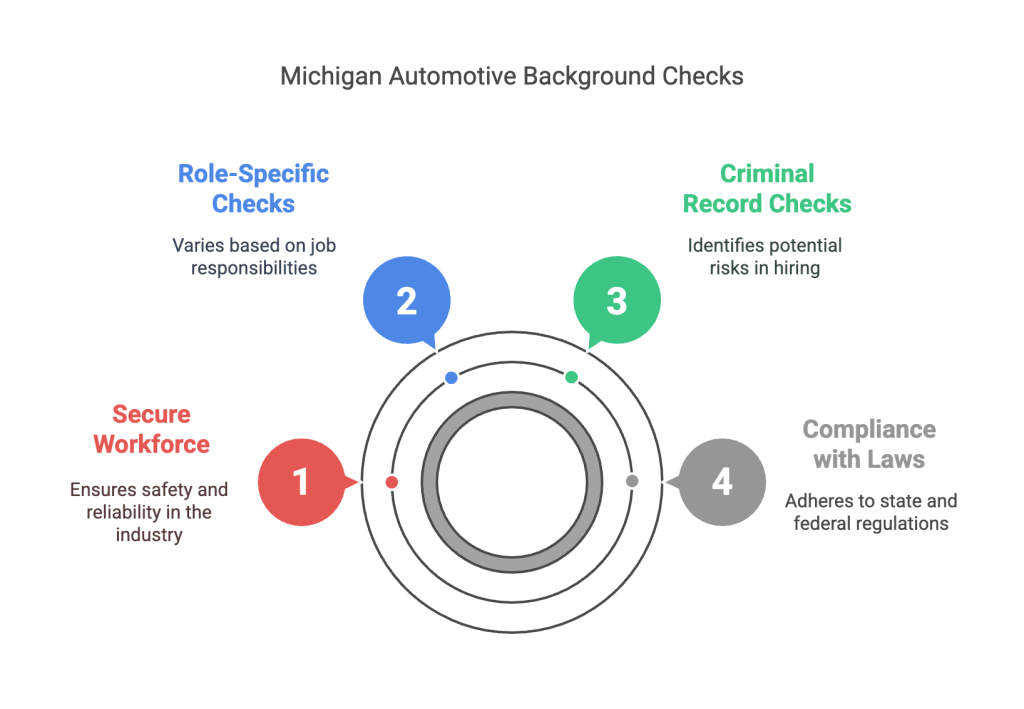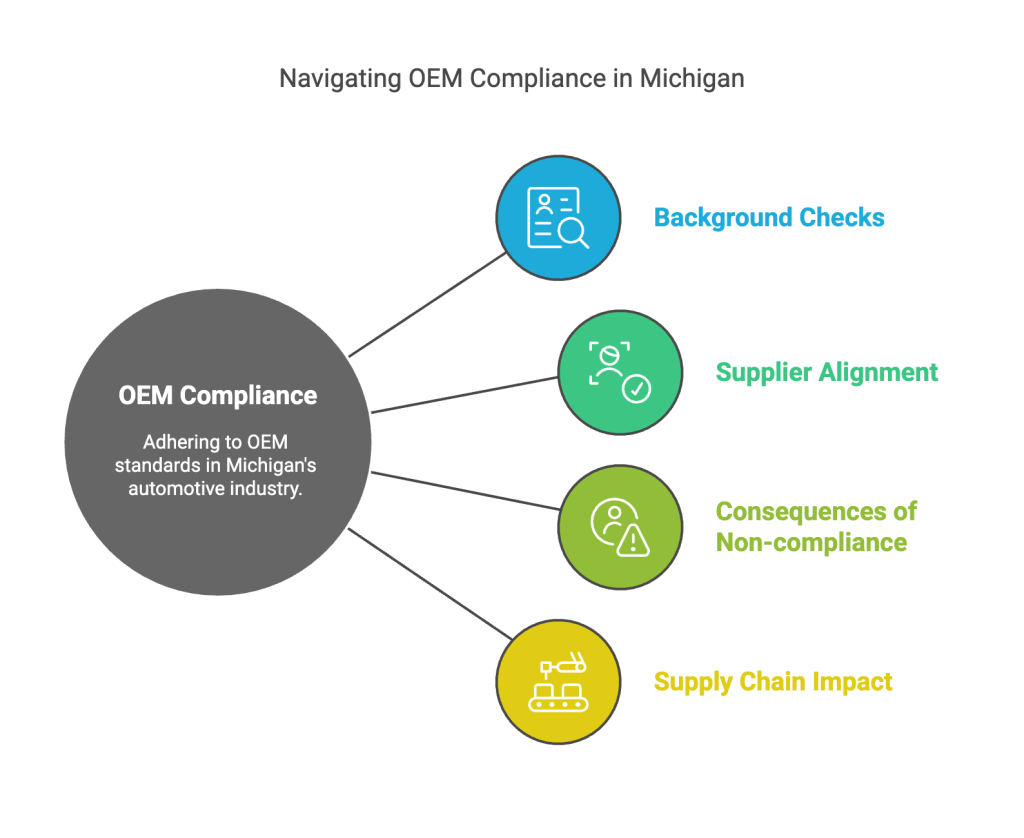The automotive industry is a cornerstone of Michigan's economy, with Detroit famously known as "The Motor City." However, as the industry evolves, so too does the complex framework of regulations and requirements governing employment, including the crucial aspect of background checks. This guide dives into the specifics of Michigan automotive background checks, providing detailed insights for anyone navigating this essential part of the hiring process.
Whether you're part of an OEM (Original Equipment Manufacturer), a supplier, or even an applicant looking to understand the screening processes, this comprehensive guide will help you grasp the nuances of the industry's requirements.
Key Takeaways
- Michigan's automotive industry relies heavily on background checks to ensure a safe and reliable workforce.
- Background checks in this sector often cover criminal records, employment history, and sometimes financial data.
- OEMs and suppliers implement strict compliance standards requiring thorough checks to maintain safety and industry relationships.
- Detroit's unique focus on comprehensive background screening incorporates both historical data and modern technology.
- Legal and ethical considerations in background checks emphasize transparency, fairness, and confidentiality.
Introduction
Michigan stands tall in the automotive industry, often referred to as the beating heart of car manufacturing in the United States. Known as "The Motor City," Detroit has been a driving force behind this sector. The region's economy thrives on automotive success, making it critical to have a workforce that meets the highest standards of integrity and safety.
Background checks play a central role in maintaining this integrity. They ensure that employees are fit to uphold the safety, security, and compliance standards that the industry demands. In an environment where quality and reliability define success, understanding who makes up your workforce is more than just prudentâit's necessary. Whether you are part of an OEM, working with suppliers, or a potential employee, knowing the importance of these checks is crucial.
Do you want your company to lead the industry by example? Ensuring thorough and compliant background checks is your first step.
Understanding Michigan Automotive Background Checks
Background checks in Michigan's automotive industry aim to ensure a secure and reliable workforce. They are designed to verify the trustworthiness and qualifications of individuals entering this vital sector. Whether you're working for an OEM or as a supplier, these checks are fundamental in maintaining safety and compliance with industry standards.

The scope of these checks varies across different roles. Typically, OEM employees, supplier staff, and certain applicants are all subject to screening. The scrutiny isn't one-size-fits-all; it covers multiple areas including criminal records, past employment, educational qualifications, and sometimes financial history. Specific emphasis is often placed on positions that involve access to sensitive information, financial duties, or operational tasks within production lines.
Criminal background checks are a primary component, reflecting Michigan's adherence to state laws that govern the use of such records in hiring. These checks aim to protect the organization and its clients by identifying any potential risks presented by a candidate's history. While federal laws provide a framework, Michigan has its own set of rules that are crucial for employers to follow.
Employees at all levels, from management to factory workers, may undergo varying degrees of screening based on the risk associated with their roles. Understanding these layers of scrutiny can equip you to navigate your responsibilities, whether you're managing the hiring process or embarking on your automotive career journey.
Keeping track of these requirements ensures that both organizations and candidates remain compliant, fostering a professional environment where trust and safety prevail. Are you prepared to meet these industry demands?
Key Elements of Background Checks in the Auto Industry
When it comes to employment in Michigan's automotive sector, background checks are crucial. These checks aren't just about crossing t's and dotting i's. They focus on confirming credentials and ensuring a safe and compliant workplace.
Employment Verification: Knowing the genuine work history of a potential employee helps assess their experience and reliability. Employers typically contact previous employers to confirm dates of employment, job titles, and sometimes reasons for departure. If there's a gap or inconsistency, it might not be a deal-breaker, but it does raise questions. Have you reviewed your work history for accuracy lately?
Criminal Record Check: Criminal background checks are a staple in the industry to mitigate risks related to theft, fraud, or violence. Michigan's "Ban the Box" laws require employers to evaluate qualifications before inquiring into criminal records. However, certain roles, especially those entailing security or sensitive responsibilities, mandate thorough scrutiny. How would a past conviction influence your job opportunity?
Credit History Review: Credit checks are not universally applied. They're relevant for positions involving financial duties, where a candidate's financial history might indicate risk factors. Federal law mandates disclosing this practice and obtaining written consent from the candidate. Do you know if your role subjects you to a credit check?
Drug Screening: Safety is paramount in an industry where large machinery and production lines converge. Drug screenings help ensure employees are sober and capable of performing their duties without endangering others. Consider your stance on workplace drug use policiesâdo they align with the commitment to a safe work environment?
Each of these elements plays a distinct role in crafting a secure, trustworthy work setting. When preparing for a background check, be honest and clear. Transparency can open doors just as fast as dishonesty can close them.
OEM Compliance in Michigan
OEMs, or Original Equipment Manufacturers, are held to stringent compliance standards in Michigan's automotive industry. Employers must ensure that their workforce adheres to both state and federal guidelines when conducting background checks. These checks often include a mix of employment history, criminal records, and drug tests. For professions with financial responsibilities, credit checks may also be necessary. This process helps in maintaining trust and safety within the industry.

For suppliers, OEM compliance standards create a ripple effect. Suppliers must align their screening procedures with those of OEMs to maintain business relationships. This includes adhering to similar background check requirements and ensuring that their workforce meets the OEMâs criteria for employment.
Non-compliance with these specifications can lead to significant consequences. An OEM caught with lapses in its screening process risks legal penalties and damage to its reputation. Moreover, failure to comply might sever essential partnerships with suppliers or clients, which can be devastating in this competitive industry.
Navigating OEM compliance in Michigan isn't just about meeting the standardsâit's about understanding how these standards shape the entire supply chain. Would you be prepared if faced with an audit of your hiring practices today?
Detroit Auto Industry Screening
In Detroit, the heartbeat of the automotive industry, background checks carry unique considerations. Local operations require a sharp focus on balancing historical legacies with modern-day demands. Unlike other regions, you'll find that Detroit leans heavily on both historical criminal data and advanced screening technology to uphold industry standards.
Detroit's auto plants and associated businesses often go beyond the basics. They prioritize comprehensive checks to cover extensive criminal history reports, federal watch lists, and even digital footprints. This isn't just box-ticking; itâs about ensuring integrity and safety in environments where split-second decisions can have significant consequences.
For example, a case from an OEM in the heart of the city showed that a missed flag during a background check led to significant operational delays. This incident prompted them to overhaul their screening protocols, incorporating more robust measures and technology ensuring more thorough checks.
Consider whether your current practices reflect the stringent demands typical in Detroit. Are your screening processes thorough enough to uncover hidden liabilities? Engaging with local experts and third-party services specializing in the region can provide an edge. Equip your HR and compliance teams with the latest tools, ensuring readiness for the industry's evolving landscape.
Ultimately, Detroit's industry screening practices offer a blueprint for meticulous diligence. They stress a proactive approach, leveraging technology while respecting local and state laws. Whether you're an OEM, supplier, or a potential employee, understanding Detroit's emphasis on comprehensive background checks is integral to navigating and succeeding in Michigan's auto industry.
The Supplier Perspective
Suppliers in the Michigan automotive industry face unique responsibilities when it comes to employee background checks. Their obligations can be as rigorous as those of the OEMs they supply to, ensuring that the workforce is reliable and trustworthy.
First, let's discuss supplier requirements. Suppliers must conduct thorough checks to verify the employment history, criminal records, and sometimes financial backgrounds of potential hires. This is crucial, given the competitive and high-stakes nature of the auto industry, where a single oversight can have widespread consequences.
Integration with OEM procedures is essential. Suppliers often need to align their screening processes with the stringent requirements set by their OEM partners. This integration isn't just about matching standards; it's about ensuring that their workforce can smoothly collaborate with OEM operations. For instance, if an OEM mandates compliance with specific industry regulations, suppliers must reflect these standards in their own practices.
Challenges are plenty. Suppliers frequently grapple with ensuring consistency across diverse roles and operations. Variations in state and local laws can add complexity, influencing how checks are conducted and what information can be considered. Overcoming these challenges starts with understanding the nuances of both state-specific laws and OEM requirements.
Best practices are crucial for effective screening. Regularly updating policies to reflect new legal requirements, investing in comprehensive training for HR personnel, and leveraging reliable screening tools can lead to more accurate and timely checks. Establishing clear communication channels with OEM partners can ensure that any changes in compliance standards are promptly reflected in supplier operations.
Are you prepared to align your supplier practices with the broader demands of Michigan's automotive industry? A proactive approach in integrating OEM standards and addressing common challenges can set you apart as a reliable partner in the supply chain.
Navigating Legal and Ethical Considerations
When conducting background checks in Michigan's automotive industry, understanding the legal landscape is crucial. The Fair Credit Reporting Act (FCRA) sets the foundation for these checks. Before conducting a background check, you must inform the applicant in writing and obtain their consent. This transparency is required for compliance and builds trust with your candidates.
Legal frameworks aren't just about permission. They guide how you use the information. The Equal Employment Opportunity Commission (EEOC) warns against blanket policies that automatically disqualify candidates based on a criminal record. Instead, consider the nature of the crime, its relevance to the job, and the time elapsed since the offense.
From an ethical standpoint, conducting background checks goes beyond ticking legal boxes. You must balance thoroughness with fairness. This means evaluating candidates holistically rather than reducing them to past missteps. Respect their privacy by limiting checks to necessary areas relevant to job duties.
Confidentiality is non-negotiable. Safeguard personal data by restricting access to those directly involved in the hiring process. When sharing results, ensure the information is presented objectively, avoiding premature judgments.
How do you maintain fairness in your checks? Regularly review your screening practices, asking whether they reflect the values of openness and respect. By focusing on both legal compliance and ethical fairness, you not only avoid litigation but also build a workforce that's both competent and committed.
Conclusion
Thorough background checks are integral in Michiganâs automotive industry. They ensure safety, compliance, and workforce reliability. As you navigate these processes, remember that technology will continue to shape how information is collected and analyzed. Staying updated on new tools and standards can enhance your screening practices. Maintain diligence, prioritize fairness, and ensure the confidentiality of sensitive data. Robust background checks contribute to a more secure and effective workforce, benefiting both employers and employees alike.
Frequently Asked Questions (FAQs)
What disqualifies you from automotive work in MI?
Certain criminal convictions, especially those related to theft or violence, might disqualify you from working in the automotive industry in Michigan. Each company has its criteria, so it's best to check directly with the employer.
Do Michigan auto plants require drug tests?
Yes, most Michigan auto plants require drug tests as part of their hiring process to ensure safety and productivity in the workplace.
How far back do auto industry checks go in MI?
Background checks for the automotive industry in Michigan typically cover the past seven years. However, this can vary depending on the position and specific company policies.
Can a DUI affect employment at a Michigan OEM?
A DUI can impact your employment prospects, especially if the job involves driving or operating heavy machinery. Employers often consider the severity and recency of the offense.
Are expunged records visible to Michigan auto employers?
Expunged records are generally not visible to employers. Once a record is expunged, you can legally state that the incident did not occur.
Do temporary auto workers need background checks?
Yes, temporary auto workers are often required to undergo background checks, ensuring they meet the same safety and security standards as permanent employees.
How to verify manufacturing certifications in MI?
You can verify manufacturing certifications by contacting the issuing organization or using online databases that track certifications relevant to the Michigan automotive industry.
Whatâs the cost of automotive checks in Michigan?
The cost of background checks in Michigan can vary, typically ranging from $30 to $100, depending on the depth of the check and the company conducting it.
Are international workers screened differently in MI?
International workers may face additional steps in the screening process due to visa requirements and the need to validate foreign credentials or work history.
Do Michigan suppliers follow federal DOT checks?
Yes, Michigan suppliers who handle transportation or logistics must adhere to federal DOT regulations, which include specific checks and compliance standards.
Do Michigan automotive companies hire felons?
Some Michigan automotive companies may hire felons, depending on the nature of the conviction, its relevance to the job, and the companyâs policies on rehabilitation and employment equity.
What education is required for a Michigan auto industry job?
Education requirements vary. Entry-level positions may require a high school diploma or GED, while specialized roles might demand technical degrees or certifications in automotive technology.
Can past job terminations affect your chances?
Past job terminations can affect your employment prospects if they are frequent or related to performance issues. Transparency with potential employers and learning from past experiences can help.
Do Michigan auto companies offer training programs?
Yes, many Michigan auto companies offer training programs and apprenticeships to help workers advance their skills and ensure they meet industry standards.
Definitions
Employment Verification
Employment verification confirms a candidateâs previous work experience. Employers contact former workplaces to validate job titles, dates of employment, and roles held. This process helps ensure the applicant has the skills and experience listed on their resume. Gaps in work history donât always disqualify someone but may raise follow-up questions. Have you checked your resume for accuracy recently?
Criminal Background Check
A criminal background check reviews if a candidate has a record of convictions or legal issues. It helps identify risks that may impact workplace safety, reputation, or compliance. Roles with sensitive access or safety duties often face more scrutiny. In Michigan, checks must comply with state laws like Detroitâs âBan the Boxâ rule. Would your history stand up to a detailed review?
Credit History Review
This review looks at a candidateâs financial background, especially for jobs with money-handling responsibilities. Employers check credit reports to spot signs of debt or financial risk. By law, they must disclose the check and get written consent first. Not every role requires thisâdoes yours?
Drug Screening
Drug screening detects substances that may impair an employeeâs ability to perform safely. This is standard in the auto industry, where operating heavy machinery is common. Many employers use urine tests during pre-employment or randomly during employment. When was the last time your company revised its drug policy?
OEM Compliance
OEM compliance refers to how Original Equipment Manufacturers follow hiring regulations, including background checks. It also affects suppliers, who must match these screening standards. Falling short can damage partnerships or lead to audits. Are your HR policies aligned with your OEM partnersâ expectations?
References
- Nationscreen - Background Checks in Automotive Industry
- AB Global - Manufacturing and Automotive Industry Background Checks
- InfoMart - Background Checks for the Automotive Industry

GCheck Editorial Team
Meet the GCheck Editorial Team, your trusted source for insightful and up-to-date information in the world of employment background checks. Committed to delivering the latest trends, best practices, and industry insights, our team is dedicated to keeping you informed.
With a passion for ensuring accuracy, compliance, and efficiency in background screening, we are your go-to experts in the field. Stay tuned for our comprehensive articles, guides, and analysis, designed to empower businesses and individuals with the knowledge they need to make informed decisions.
At GCheck, we're here to guide you through the complexities of background checks, every step of the way.





